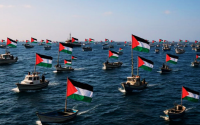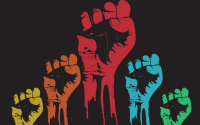30 April 2005Guardian
Sudan's Islamist regime, once shunned by Washington for providing a haven for Osama bin Laden as well as for human rights abuses during decades of civil war, has become an ally in the Bush administration's "war on terror".
Only months after the US accused Khartoum of carrying out genocide in Darfur, Sudan has become a crucial intelligence asset to the CIA.
In the Middle East and Africa, Sudan's agents have penetrated networks that would not normally be accessible to America, one former US intelligence official told the Guardian. Some of that cooperation has spilled over into the war in Iraq: Sudan is credited with detaining foreign militants on their way to join anti-American fighters there.
Sudanese agents have also helped the CIA to monitor Islamist organisations in Somalia.
"The intelligence relationship is the strongest thread between Washington and Khartoum," the official said. "Khartoum is probably the only government in the Arab League that has contributed in a major way to the protection of US forces and citizens in Iraq."
News of the growing cooperation was first reported in yes terday's Los Angeles Times. The paper traced the thaw in relations since 2001 to a milestone last week: the visit to Washington by Sudan's intelligence chief, Salah Abdallah Gosh. It reported that Sudan's secret police had begun to crack down on suspected Islamists, had shared evidence with the FBI and allowed US personnel to interrogate al-Qaida suspects.
In May 2003, Sudanese security forces raided a suspected terrorist training camp and deported more than a dozen, mainly Saudi, militants to Arab states which work closely with US intelligence services, the newspaper said.
Yet a decade ago Sudan was a haven to Bin Laden and other international outlaws, such as Carlos the Jackal. In 1993, it was placed on the US state department's list of terrorist regimes. Approaches from Khartoum were rebuffed - even as it offered its services against an emerging al-Qaida in the 1990s.
"Sudan tried to hand over two guys implicated in the 1998 bombing of the US embassies in east Africa, and the response was to send cruise missiles to hit the aspirin factory in Khartoum," the official said. "They offered up Bin Laden in 1995, and we said we don't even have an indictment on him."
Officially, Washington's position towards Sudan remains unchanged. "Sudan is still considered a state sponsor of terror," a state department spokesman said yesterday.
News of General Gosh's visit to Washington caused consternation in human rights circles. The general is among 51 Sudanese officials implicated in human rights abuses by the international criminal court.
"I quite understand that the war on terrorism means dealing with bad actors, but to fly in one of Sudan's chief committers of what Washington has formally described as genocide is deeply disturbing," said an independent Sudan analyst, Eric Reeves. He noted there had been signs of a slight thaw towards Khartoum for some time - despite the state department's official stance.






